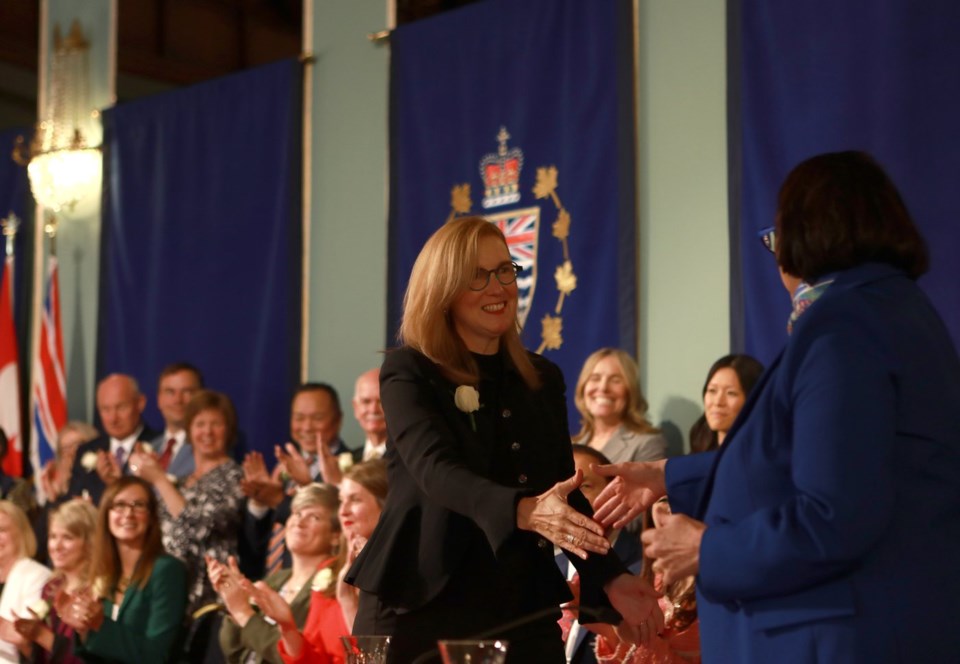VICTORIA — As economists met British Columbia's Finance Minister Brenda Bailey around a Vancouver hotel conference table and online on Friday, one announced news fresh to hand, sending a ripple through the group as they discussed the fate of the province's economy.
He told the meeting of the Economic Forecast Council for B.C. that a report had emerged out of Washington — U.S. President Donald Trump's promised 25 per cent tariffs on Canadian exports were said to be delayed by a month to March 1.
But before Friday's meeting even ended, it was told a new report had scotched that hope, and Trump was proceeding with the tariffs on Saturday after all, as originally threatened.
The conflicting reports underscore what Premier David Eby would call the "chaos and confusion" emerging from Washington as the prospect of U.S. tariffs on Canadian goods closes in, and B.C. tries to plan for their impact.
Eby said during a virtual press conference that "it's hard to make sense" of exactly what has been happening with B.C.'s "closest friend and trading partner."
He said his new "war room" committee tasked with responding to the tariffs also met Friday morning, and provincial officials were working closely with business and labour leaders, as well as First Nations and other stakeholders.
The meeting included discussions about strengthening B.C.'s supply chains, reducing trade barriers between provinces, and helping people buy Canadian-made products, Eby said.
"We've had a morning of chaos and confusion in terms of trying to understand what is happening at the White House, the chaos there, the conflicting messages," he said.
Eby said he hopes Trump listens to advisers about the harmful effects of the promised 25 per cent tariffs, but B.C. is "ready for the fight" if the president's plan goes ahead on Saturday
It was "hard not to think that this uncertainty (from) the White House, the chaos that seems to be coming from there, is actually part of an overall strategy to destabilize key trading partners," he said.
But rather than speculate, the premier said B.C. must prepare to support workers, families and businesses.
"This is obviously distressing, for people on both sides of the border whose jobs and livelihoods depend on a strong trading relationship between our two countries," he said.
"If, in fact, tomorrow morning, the president does impose tariffs of 25 per cent on British Columbia, I can assure you that we are ready for the fight. We will not roll over."
Bailey had earlier described the difficulty of forward planning the economy, after the annual meeting of the Economic Forecast Council for B.C., consisting of 13 independent forecasters from across Canada.
"What I will share with you is that it's our expectation that the uncertainty that has been introduced into our economy is uncertainty that we are likely to experience for four years," Bailey said on a call with reporters, after the meeting that was open to reporters on a background basis.
“We don't know whether the tariffs are coming in tomorrow or at a later date, and it's also uncertain as to which commodities and goods will be covered by tariffs and what level the tariffs will be at."
Bailey said that despite the expected instability over the four years of Trump's presidency, the council's private-sector forecasters indicated the province was in a good position to meet the challenges of the promised tariffs.
She said in a statement that the council indicated the uncertainty of "threats from the south" may make the budget process more challenging than usual.
But she said the council told her the diversity of B.C.'s economy made it well positioned to attract new investment and development opportunities.
Council members also pointed to the difficulty of forecasting in the new Trump era.
“Our forecasts are essentially being updated on a weekly basis at this point. So for new data, for new information coming in, it's really a moving target,” said Randall Bartlett, deputy chief economist for Desjardins, who attended the council meeting.
“It's the nature of the beast of trying to forecast, you know, decisions made by the Trump administration.”
The Ministry of Finance statement said B.C.'s outlook is affected by global and domestic forces, including federal immigration targets.
Still, it said the forecasters "reaffirmed that in the absence of tariffs, they had expected steady economic growth for B.C."
The council estimates that real GDP in B.C. grew by 1.2 per cent last year, higher than the province's projection in the fall 2024 economic update, the statement said.
It said the council indicated a diverse export network and resource-rich environment give B.C. an advantage over other provinces, and some members were encouraged by the province's work to address housing supply, affordability and skills training.
In early January, it said the council forecasted real GDP growth of 1.9 per cent in 2025 and steady growth of two per cent annually on average through 2029, although the projections do not fully reflect the effect of potential U.S. tariffs.
The council will have an opportunity to revise its forecasts before B.C. is set to release its provincial budget on March 4, it added.
— With files from Brenna Owen in Vancouver
This report by The Canadian Press was first published Jan. 31, 2025.
Marcy Nicholson, The Canadian Press



